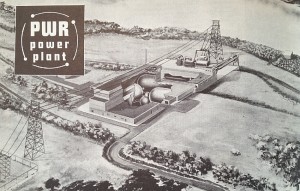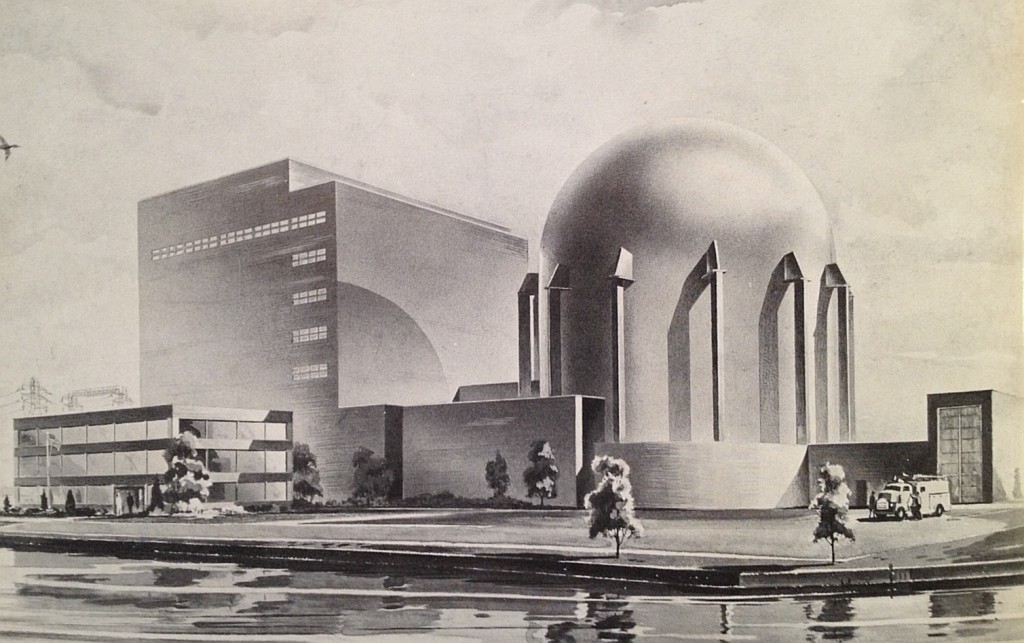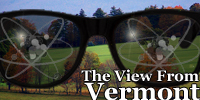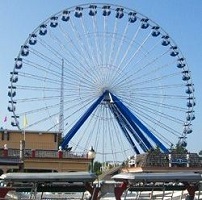Eisenhower's Atomic Power for Peace - The Civilian Application Program II

Westinghouse Electric Corporation promotional illustration showing "PWR" (Shippingport Atomic Power Station) plant and site. "Selected Articles on Nuclear Power," Westinghouse Electric (see sources).
The commercial nuclear power program in the United States was sparked by the Shippingport Atomic Power Station project-but one project does not a program make. Action by the U.S. Congress soon after the announcement of the project ensured that a wide program that would evaluate other approaches was launched:


 The 190th Carnival of Nuclear Energy has been posted at Next Big Future.
The 190th Carnival of Nuclear Energy has been posted at Next Big Future. 
 The shutdown of Vermont Yankee at the end of its current fuel cycle next fall has been announced. Now that opponents have been handed what they were working for, it might be expected that they would declare victory and go on to something else. This isn't happening. It would be normal for the state and local governments to be concerned about the economic impact of the shutdown, and begin to plan for it. But what are the "anti-nukes" doing? You might be surprised, if you didn't understand their real motive.
The shutdown of Vermont Yankee at the end of its current fuel cycle next fall has been announced. Now that opponents have been handed what they were working for, it might be expected that they would declare victory and go on to something else. This isn't happening. It would be normal for the state and local governments to be concerned about the economic impact of the shutdown, and begin to plan for it. But what are the "anti-nukes" doing? You might be surprised, if you didn't understand their real motive.
 Like many young and restless Ph.D. recipients, Tim Lucas was stricken with insatiable wanderlust. After completing his Doctorate in nuclear engineering at the Massachusetts Institute of Technology, Tim cast off the shackles of his societal commitments to begin a new life as a roving vagabond. Tim, who lived on his beloved boat Slick throughout grad school, set sail from Boston two years ago. He first headed south to the Caribbean, then through the Panama Canal to the Galapagos. He drifted among the South Pacific archipelagos, embracing all the pleasures of peripatetic life. Eventually, he finagled his way across Asia and into the Mediterranean, where he now meanders through the Dodecanese.
Like many young and restless Ph.D. recipients, Tim Lucas was stricken with insatiable wanderlust. After completing his Doctorate in nuclear engineering at the Massachusetts Institute of Technology, Tim cast off the shackles of his societal commitments to begin a new life as a roving vagabond. Tim, who lived on his beloved boat Slick throughout grad school, set sail from Boston two years ago. He first headed south to the Caribbean, then through the Panama Canal to the Galapagos. He drifted among the South Pacific archipelagos, embracing all the pleasures of peripatetic life. Eventually, he finagled his way across Asia and into the Mediterranean, where he now meanders through the Dodecanese. The 186th Carnival of Nuclear Energy has posted at Next Big Future.
The 186th Carnival of Nuclear Energy has posted at Next Big Future.  A United States appellate court recently handed down two long-awaited rulings with respect to Yucca Mountain. As most observers expected, both decisions were decidedly in nuclear's favor.
A United States appellate court recently handed down two long-awaited rulings with respect to Yucca Mountain. As most observers expected, both decisions were decidedly in nuclear's favor.